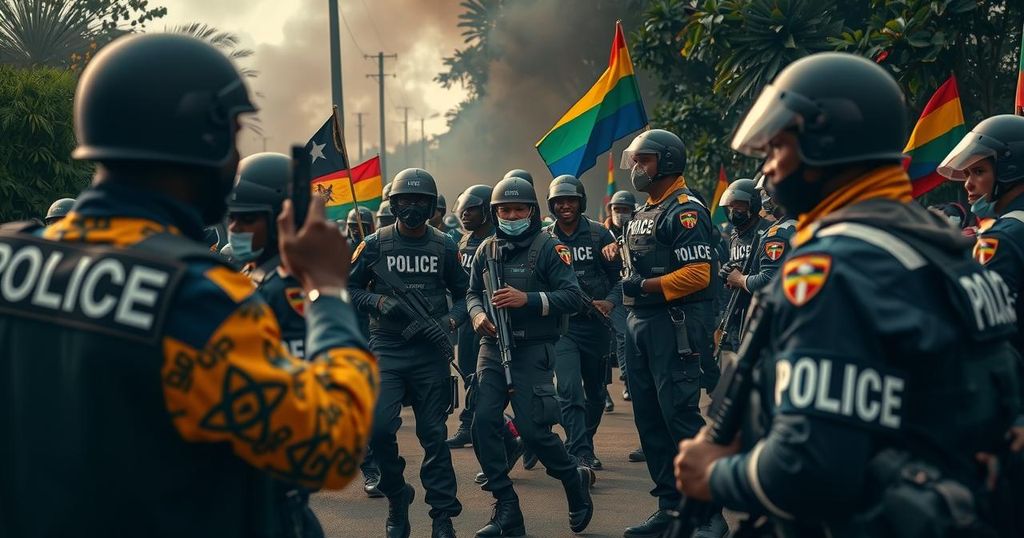World news
AFRICA, ANTONIO, ANTONIO JUAQIM, BBC, COMMISSION, DANIEL CHAPO, DEMOCRACY, ELECTIONS, FR, FRELIMO, MANUEL SAMUEL, MAPUTO, MON, MONDLANE, MOZAMBIQUE, OPPOSITION, PROTESTS, RENAMO, SAMUEL, SAO FRANCISCO XAVIER, SÃO FRANCISCO XAVIER CEMETERY, VE, VENÂNCIO MONDLANE, VIOLENCE
Amira Khan
0 Comments
Mozambique Election Crisis: Police Violence Against Protesters Leads to Tragedy
The crisis in Mozambique intensified following controversial presidential elections, leading to violent protests where police have killed multiple demonstrators, including children. The opposition claims electoral fraud, instigating nightly protests. The deaths of young individuals like 16-year-old Antonio Juaqim have incited outrage and depict the deepening social discontent against the ruling Frelimo party’s governance, reflecting a crucial moment in Mozambique’s young democracy.
Mozambique is currently experiencing a crisis following the recent presidential election, which has yielded intense protests leading to tragic violence. The protests, sparked by claims of electoral fraud by the opposition party, were marked by nightly demonstrations where citizens banged pots and pans in defiance of the government. Among those tragically killed during these protests was 16-year-old Antonio Juaqim, who was shot by police while participating in the demonstrations. His death symbolizes the growing unrest in a nation grappling with a perceived lack of electoral legitimacy and the continued dominance of the ruling Frelimo party.
Since Frelimo, the ruling political party since Mozambique’s independence, declared victory with 71% of the vote, dissent has surged, particularly among younger citizens frustrated by economic stagnation and limited job opportunities. The opposition leader, Venâncio Mondlane, who has alleged electoral manipulation, has mobilized protests despite his fear of arrest, calling for nightly demonstrations from his supporters. As a result, many citizens have shifted to protesting from their homes, mourning the loss of young lives taken by state violence.
Human Rights Watch reports that police have killed approximately 40 protesters, including at least 10 children. Mozambique’s police leadership has denied responsibility for these deaths, suggesting that opposition supporters have employed tactics that endanger children. Meanwhile, opposition figures argue that police brutality has surged, reflecting a disturbing trend where the state suppresses dissent instead of addressing legitimate citizen grievances.
The recent turmoil, marked by the deaths of young individuals like Antonio and Alito Momad, raises questions about Mozambique’s political stability and the ruling party’s legitimacy. Observers indicate that the government is out of touch with its citizens’ pressing needs for socioeconomic improvement and opportunities. As Mondlane’s supporters continue to advocate for justice and accountability, Mozambique stands at a critical juncture, reflecting the precarious balance of power in its young democracy.
The current political landscape in Mozambique is deeply influenced by the long-standing dominance of the Frelimo party, which has held power for 49 years since the country’s independence. Following the presidential elections, significant allegations emerged surrounding the fairness and legitimacy of the electoral process, predominantly voiced by the main opposition figure, Venâncio Mondlane. The public outcry against the proclaimed victory of Frelimo’s candidate, Daniel Chapo, has ignited widespread protests, particularly among the youth. These protests have escalated into violence, shedding light on the serious discontent among citizens regarding socio-economic conditions and governance. This electoral crisis has become one of the most turbulent periods for Mozambique since its transition to multi-party democracy.
The unfolding crisis in Mozambique, exacerbated by recent violent protests against the government’s electoral legitimacy, highlights the urgent need for accountability and reform. The tragic loss of young lives during these protests is a stark reminder of the consequences of political unrest and governmental suppression of dissent. As calls for justice grow louder, the Mozambican government faces significant pressure to respond to the populace’s grievances while ensuring the protection of its citizens’ rights.
Original Source: www.bbc.com




Post Comment